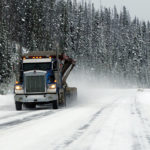Home »

Road-checks planned to limit non-essential travel
The provincial government announced today it has authorized site-specific road checks on travel corridors between regions to help enforce the non-essential travel restrictions that were announced on April 23.
On the advice of B.C.’s provincial health officer (PHO), Mike Farnworth, Minister of Public Safety and Solicitor General, issued an Emergency Program Act order to prohibit non-essential travel between three regional zones in the province.
The regional zones are:
- Lower Mainland and Fraser Valley (Fraser Health and Coastal Health regions);
- Vancouver Island (Island Health region); and
- Northern/Interior (Interior Health and Northern Health regions).

During the first weekend of the new travel restrictions, BC Ferries vehicle traffic was down more than 25% fleet-wide, and passenger traffic down more than 30%, compared to the weekend before. Resort communities and accommodation businesses have contacted the province to note significant declines in out-of-region visitors and bookings, and BC Parks has reported more than 5,000 cancellations in the past few weeks.
Building off this success in limiting non-essential travel, the province will authorize site-specific, clearly marked police road checks to further curb recreational travel.
The road checks may be put in place at any time until the order is lifted at 12:01 a.m. on May 25, (after the May long weekend). The road checks may be set up on highway corridors that connect different regions of the province to remind travellers of the order.
“These restrictions on non-essential travel are saving lives, it’s in the best interest of all British Columbians to follow them, and I know most are given the significant drop we’ve seen in out-of-region travel,” Farnworth said. “But it is also important that we get enforcement right, and consider concerns raised by the public and incorporate the feedback received from racialized communities. I want to be clear that the intent of this order is not punishment, but rather education around non-essential travel prevention to protect us all from the spread of COVID-19. My hope is that every British Columbian realizes the tremendous progress we can make if we stay close to home, and we can give the heroes in our health-care system a fighting chance at putting the current spike in cases behind us.”
When stopped at a road check restricting non-essential travel, police will only have the authority to request:
* a driver’s name, address and driver’s license;
* any available documentation regarding driver’s name and address (for example, secondary identification that confirms a driver’s residential address if recently moved);
* the purpose of the driver’s travel (documentation regarding travel is not required).
Police cannot engage in arbitrary vehicle or street checks. Site-specific enforcement measures will be informed by ongoing discussions with stakeholders on limiting the impacts to the public and racialized communities. If police have reasonable grounds to believe that a person has travelled for a non-essential purpose, they can direct the traveller to turn around and leave the region. These measures will be limited to site-specific and authorized police operations on travel corridors between regions, the Ministry of Public Safety and Solicitor General and Emergency Management BC stated in a media release.
“The goal of these road checks is education and further discouraging people from travelling for non-essential reasons. If compliance measures are deemed necessary by police, fines can be handed out. At the discretion of police, a contravention of this Emergency Program Act travel order may be subject to a $575 fine,” the release noted.
The RCMP will deploy a trained, dedicated team to manage and enforce road check locations, and ensure interactions are in line with the intent of the order and all existing police policy and police standards.
While the travel order puts legal limits only on travel between regional zones, the PHO’s guidance remains unchanged throughout B.C.: everyone should continue to stay within their local community – essential travel only.
Facts about on non-essential travel limits in B.C.
This order applies to non-essential travel. It does not apply to:
* moving to a different principal residence or assisting a person to move for that purpose;
* carrying out a work-related purpose, including volunteer work;
* commercially transporting goods;
* receiving health-care services or social services or assisting someone to receive those services;
* attending court;
* complying with a court order;
* exercising parental responsibilities, including spending parenting time with a minor child;
* accessing child care;
* attending classes or receiving training through a post-secondary institution or school;
* responding to emergencies or critical incidents, including incidents that involve search and rescue operations;
* providing care or assistance to a person who requires care or assistance because of
* a psychological, behavioural or health condition, or
* a physical, cognitive or mental impairment;
* visiting by an essential visitor or a social visitor as provided in the guidance of the Ministry of Health set out in a document titled Ministry of Health – Overview of Visitors in Long-Term Care and Seniors’ Assisted Living that went into effect on April 1, 2021;
* attending a funeral service;
* travelling under the authority of a variance of an order issued by the provincial health officer under the Public Health Act if the variance was made before this order comes into force;
* travelling for the purpose of avoiding the risk of abuse or violence;
* travelling by residents of the local health area of Bella Coola Valley or Central Coast to Port Hardy to obtain essential goods and supplies;
* travelling by residents of the local health area of Hope to Chilliwack to obtain essential goods and supplies;
* travelling by residents of the Northern Health Authority region into the Nis×a’a Health Authority region;
* travelling by residents of the Nis×a’a Health Authority region into the Northern-Interior Health Authority region;
* returning to a person’s own principal residence.
Lead image: Electronic signage at the B.C./Alberta border on Highway 3 asking travellers to stay local. Steve Schafer photo
e-KNOW







